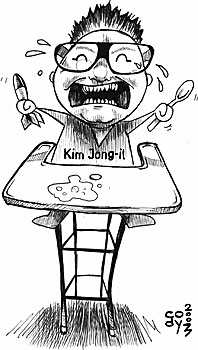
Illustration by Cody Angell
|
By Caitlin Hall
Arizona Daily Wildcat
Thursday February 20, 2003
The U.N. Security Council doesn't want to talk about North Korea. Don Rumsfeld, Colin Powell and Condoleezza Rice don't want to talk about North Korea. We, in our fever-pitched Iraq melee, certainly don't want to talk about North Korea.
It's almost comical: a red-eyed U.S. spoiling for a fight with a reluctant Iraq, while Kim Jong-il does his best to provoke the world.
The world's response ÷ "C'mon, North Korea, cut it out. Please?" ÷ is somewhat understandable; after all, it's a lot easier to engage a country with no realistic hope of manufacturing nuclear weapons than one that already has them. But is that really enough to explain the U.N.'s bizarrely noninterventionist approach to the brewing Asian crisis? Even China, which is far more initiated in Eastern politics than the U.S., has shied away from taking a firm stance on North Korea's recent belligerence.
It is mystifying that when a conflict is morally ambiguous, as it is with Iraq, the U.N. is more than eager to foist its will on international affairs, but when the threat ÷ if not the path to reconciliation ÷ is clear, it shrinks from the public eye faster than an anemone probed by a merciless toddler. Whatever happened to diplomatic backbone?
The U.S. strategy, on the other hand, is woefully consistent. Picture, if you will, a child who has been beaten by a relative since its birth, well into adulthood. The trauma of this savagery scars the child, renders it volatile and combative, but the beatings continue for decades. Finally, the child erupts in fury and fights back, threatening to kill his relative and everyone else within reach.
It doesn't matter if the relative was unduly aggressive or if he actually had it in mind to tame what was from birth a wayward child; all that matters is that he not, for the sake of constancy, beat the child for his insolence.
Why is it, after all, that Kim Jong-il has specifically targeted the United States? Why, besides its spineless disposition, has the U.N. passed off the Korean threat as a mess for America to deal with, while wholeheartedly rejecting that rationale when it comes to Iraq? What could make us privy to such an unasked-for, selectively unilateralist blessing?
It turns out North Korea's wrath is not so different from Iraq's after all; it too was the object of crippling sanctions engineered by the United States. While Iraq's sanctions were enforced by the U.N., however, North Korea's were enacted and discharged by the U.S. alone.
Of course, those sanctions were contrived to drive from power a regime that was responsible for the death of 55,000 American soldiers. History shows, however, that economic sanctions are a lousy way of expelling autocrats, as is evinced by Iraq and Cuba.
It doesn't matter that North Korea is the wayward son of the nuclear world; what matters now is that it is a part of that world, and that it's controlled by a mentally unstable powermonger who watched his nation crumble as an adolescent and has since witnessed it besieged by pestilence, famine and abject poverty.
Accordingly, the way to manage North Korea now is not as the penitence-bestowing relative who righteously disciplines an impudent child, but rather as one who recognizes the dementia and danger merged in that child.
Translation: The administration's crafty carrot-and-stick routine is a defunct strategy; deterrence is a dead concept when it comes to North Korea. Kim Jong-il is not backed into a corner. He's in the middle of the ring, swinging wildly, daring the world to take him on. He is vengeful, impulsive, and his best hit packs the same punch as that of the U.S.
Slamming North Korea with more sanctions will only further strain relations, if not provoke outright war. Agreeing to negotiate under threat of nuclear attack is not the cowardly retreat the Bush administration makes it out to be; on the contrary, it's the most coherent and responsible reaction conceivable.
The U.S. can't let its hubris get in the way of world order. In a situation such as this, our primary concern isn't consistency. It's containment.

